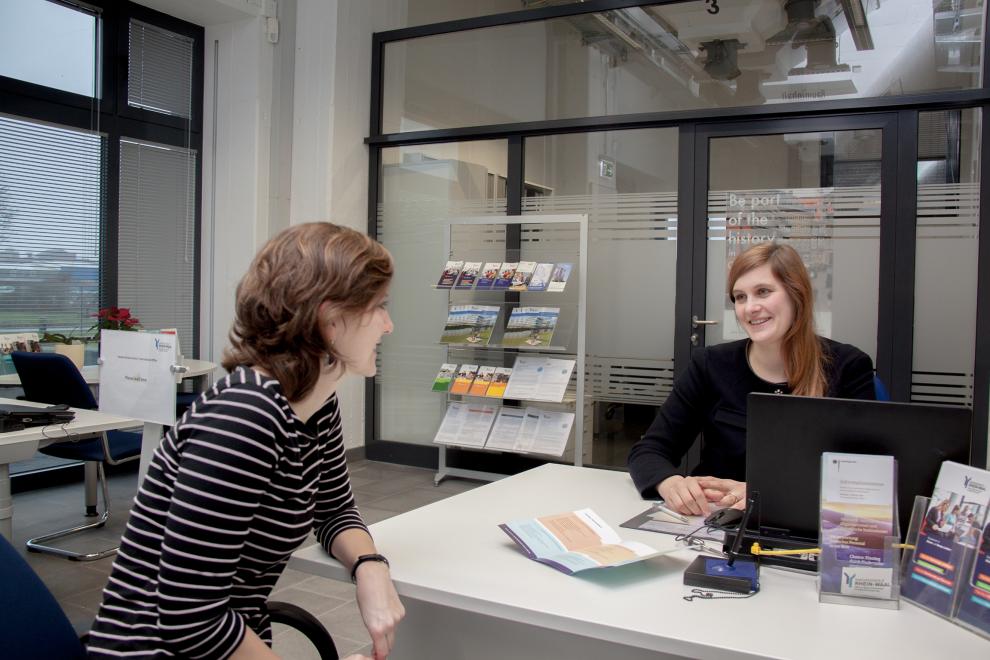Psychological Counselling Service
for Students at Rhine-Waal-University of Applied Sciences


Welcome to winter semester 2025/26 ...
...and HSRW's psychological counselling service for students is here for you - by phone, online or in person on campus Kleve and Kamp-Lintfort.
Students who would like individual psychological support due to their current emotional or social situation can contact Pia Weigelt-Lindemann, a trained psychologist, to set up appointments: psych-contact@hochschule-rhein-waal.de. Counselling sessions can be held in German or English. Please allow for waiting times, as the psychological counselling service is only available Tuesday to Thursday.
Some examples of study-related topics of psychological counselling include feeling overloaded, self-doubts, depressive moods, feelings of loneliness, difficulties in social contact/situations, family or partner problems, exam anxiety, anxiety about the future or other fears, difficulties maintaining motivation, attention or concentration, problems with addictive behaviour, eating habits or sleep, or with stress and tension in general.
Please note: psychological counselling is no and does not replace a psychotherapeutic treatment!
Emergencies / acute mental health crises
Information about need immediate help options due to an acute mental health crisis
Outpatient psychotherapy
Information about available outpatient psychotherapeutic treatment options
Psychosocial advising services
Further Information
Additional info and tips for students on the topics of mental health and psychology
Studying at a University is an exciting time filled with new experiences…
At the same time you are facing yet unknown challenges: adapting to a new, different education system, adjusting to new surroundings, maybe leaving your parents and moving away from home to a new city or even country and making new friends - all accompanied by the wish and also the need to, more and more, grow independent and the pressure that comes with it. Mastering these challenges can be a fun, enriching experience but it can also lead to stress and other difficulties that may seem impossible to overcome on your own.
Do you have social, emotional, psychological or psychiatric problems that strongly affect your daily life and hinder you in succeeding your studies successfully?
If you have already spoken to persons of your trust or consulted other contact persons or institutions within and/or outside the University and, after that, wish more specified, individual psychological counselling, then feel free to contact the “Psychological Counselling Service of the Rhine-Waal University of Applied Sciences (HSRW)”. It provides short term individual counselling and support to students. Our job is to encourage your own “self-help efforts”, meaning, we help you to better understand your concerns and discover or build up your inner strength and resources. Step by step, building upon that, we are developing and implementing manageable ways for you to deal with your concerns.
Get in Contact:
For general questions or your request for appointments, please send a short email to: Pia Weigelt-Lindemann, psychologist, psych-contact@hochschule-rhein-waal.de. She will get back to you by email with further information as soon as possible, e.g., how to schedule individual appointments. Please note: unencrypted emails are no secure form of communication. We therefore ask you, to ensure privacy, to give details of your situation only in personal conversations.
Important to know:
Psychological counselling is always free of charge, absolutely confidential and can also be anonymous, if you wish. Medical confidentiality is valid towards third parties and also all employees of the University. Our psychological counselling takes into consideration the individual diversity of the origin, biography, personality and life style of the person seeking advice and is specialized in the specific challenges of student life and academic studies.
Contact
Pia Weigelt-Lindemann
psychologist
Contact:
psych-contact@hochschule-rhein-waal.de
Scheduling via email contact
Counselling days:
Tuesdays, Wednesdays, Thursdays
If you are experiencing a severe mental health crisis or in cases of emergency, please contact the nearest mental health hospital. Crisis/Emergencies
Info:
Psychologische Hilfe Ukraine
Deutsche Gesellschaft
für Psychologie - DGPs
https://www.dgps.de/schwerpunkte/psychologische-hilfe-ukraine/
NEW 01.2025: ZEIT CAMPUS
"mental health" guide
(2nd rev. ed.; only in German)
https://www.zeit.de/campus/ratgeber-mental-health/index
